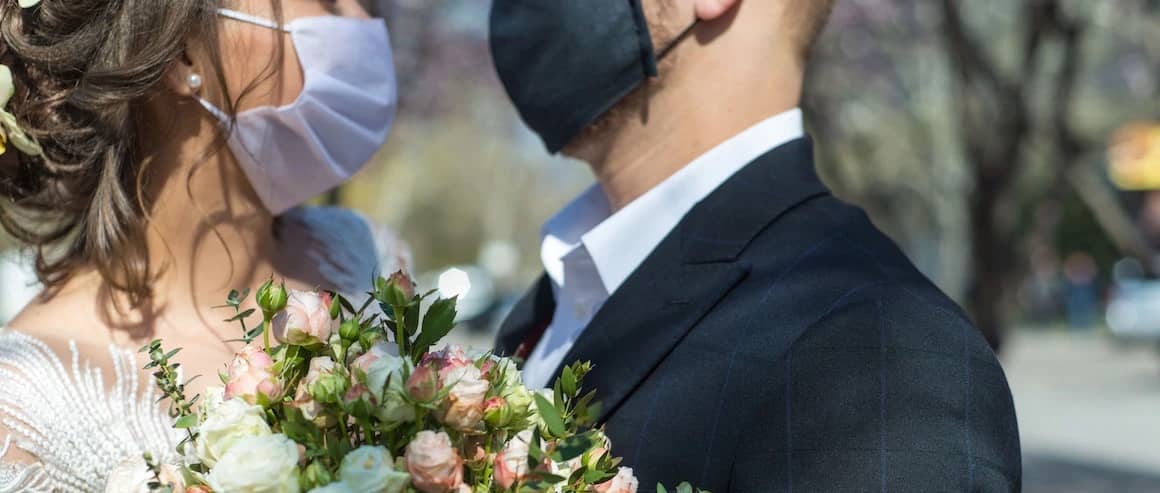
How To Postpone Your Wedding In A Pandemic
7-Minute ReadUPDATED: June 03, 2022
Although long-shuttered restaurants and retailers are beginning to reopen their doors, we’re unfortunately not out of the woods yet. As we endeavor to pinpoint new rules and regulations, the wedding industry, in particular, has been scrambling to find its footing in the current climate.
Since states across the country take different stands as to whether to allow large gatherings, tens of thousands of hopeful couples are still struggling to determine what COVID-19 means for their nuptials. Is it better to postpone or continue to plan a wedding during these unprecedented times?
If COVID-19 has thrown a wrench in your wedding plans, you’re likely working yourself into a frenzy trying to figure out how to proceed. Instead of throwing your hands up in despair, read through our comprehensive guide on how to postpone or plan your wedding during COVID-19.

Photo courtesy of B.Worley Productions + Sean Twomey with (2)me Studios
2020 Weddings And COVID-19
Firstoff, to get the pulse on the industry, Belief Wedding Creators, an international platform for wedding professionals, conducted a recent study of over a thousand wedding planners and vendors in 47 countries, who had booked an average of 18.3 weddings for 2020. Based on their responses, the survey found that 30.2% of 2020 weddings had been postponed for later in the year, 15.6% had been postponed for 2021, and 6.29% had been canceled.
Although these results show a majority of couples deciding to reschedule their nuptials for later in the year, many couples actually may be getting more creative when it comes to their wedding plans. Some are even beginning to plan two separate events.
“We are starting to see many weddings postpone to 2021 because there is still so much uncertainty about what a 2020 wedding will look like. Couples are starting to see images of small weddings taking place and are having a ceremony with close members of their family and friends and then postponing the big celebration to when we have more answers and guidelines,” says Brian Worley, owner and creative director of B. Worley Productions. “I also think that as couples are realizing that there are limitations for food service, bars, all waitstaff wearing masks and gloves, they are starting to understand that their 2020 dream wedding may not be their dream wedding.
“I have a bride from New Jersey that is having a destination wedding in the South, and they are not sure that their guests will be allowed to enter the state,” adds Worley. “So there are numerous obstacles that are still making the decision hard, but 2021 is starting to look like a very busy year.”
The thought of waiting another year before tying the knot may be heartbreaking for couples, but the restrictions and confusion regarding 2020 weddings have led many to choose the safer path. As a result, dates for 2021 are booking up – and fast – as brides and grooms desperately hold out hope that the world will get a handle on COVID-19 by next year.

Photo courtesy of RENT MY WEDDING + Marissa Kay Photography
Should You Postpone Your Wedding Due To COVID-19?
If you were planning on getting married this summer, chances are you’ve decided to postpone or at least hold a more private ceremony. However, for those of you who had planned to walk down the aisle this fall or winter, you may still be wrestling with the decision.
“Due to the fact that states are reopening and not reporting a major jump in COVID numbers, in addition to watching other hard-hit countries recover, many wedding vendors are not urging fall brides to postpone their wedding,” says Amy McCord Jones, wedding planner and owner of Flower Moxie, an online business that sells flowers to DIY brides. “However, postponement is such a personal decision, and many factors come into play, such as vulnerable guests, destination events or large guest counts. It really needs to be decided on a case-by-case basis.”
The considerations Jones mentions are in line with the Centers for Disease Control and Prevention’s recommendations, which urge those determining whether to postpone or cancel larger events to base their decision on the size and density of the event, the number of guests who are at a higher risk, the number of cases of COVID-19 in the community and the possibility of reducing the number of attendees.
If you’re wondering what these guidelines mean for your celebration, Samantha Bellinger, event planner and owner of 620 Events, says, “I recommend first considering how hard hit your area has been, as well as the phased opening plan for your town/state/country. Also, contact your venue to determine what additional restrictions they are subject to in order to comply with regulations. This will provide you with the backdrop of how many people you’ll be able to celebrate with and what restrictions you might have (number of people, spacing between tables, etc.).”
When it comes down to the decision of whether to hold off on your wedding due to COVID-19, Bellinger puts it simply: “Postpone if you aren’t OK with the idea of 30 or 60 guests total, everyone in masks and out-of-town guests or elderly family members not being able to attend.”
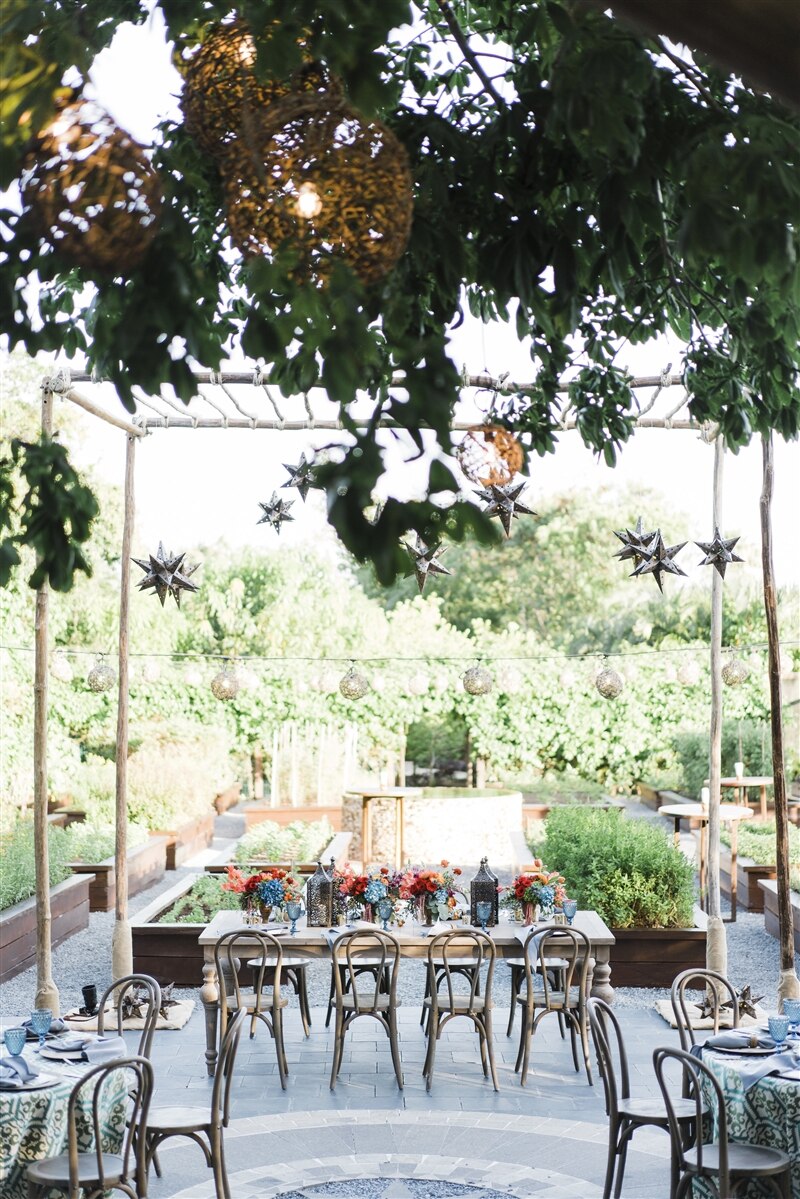
Photo courtesy of B. Worley Productions + James and Schulze
What 2020 Weddings Could Look Like
As you decide whether to postpone your wedding or move full-speed ahead with your preexisting plans, you should have a clear understanding of the precautions that you and your guests will have to take and what 2020 weddings will most likely look like. It’s understandable that you may not want to wait – this is the day you’ve been long awaiting. Still, you may need to temper your expectations. Weddings hosted during COVID-19 may be able to proceed, but they will certainly deviate from the norm.
“Some things we’re encouraging our couples to think through are venue capacity with social distancing, requirements that guests wear masks, hand sanitizing stations and how food and drinks will be served,” says Miranda Crace, wedding planner and founder of Spoke Events, a Detroit-based event planning company.
“Different venues are currently operating under different capacity restrictions as states begin to reopen. Some must keep guests 6 feet apart, while others can reopen with 25% capacity,” adds Crace. “It’s important that you clarify what your venue’s reopening policy is and create a floorplan that is consistent with that.”
Depending on the guidelines your venue is following and the extent of new cases that arise in the area at the time of your nuptials, the restrictions may affect the look and feel of your wedding, the number of guests you can host and the types of events you can plan for the celebration. Once you coordinate with your venue and vendors about the proper safety precautions to take, you’ll have to inform your guests, so they have a clear understanding of the expectations before they arrive.
“I think that you have to realize that the photos will look a bit different with guests in masks,” says Worley. “Things could end up costing more as regulations for more staff, different serving practices for food and beverage require different staffing and locations, and as a vendor, we have to find staff and vendors that are willing to work. Everyone needs to be protected during this, so the landscape of the wedding does look very different.”

Photo courtesy of B. Worley Productions + Sean Twomey with (2)me Studios
When Should You Make The Decision To Postpone?
For those planning fall weddings, Marie Kubin, CEO of RENT MY WEDDING, the largest online rental company in the U.S., has found that brides and grooms are even postponing the decision. “Couples are using the wait-and-see approach and will make a final decision as it gets closer to the wedding date,” she says.
Instead of jumping into a new wedding date, some are keeping their fingers crossed that there will be a vaccine ready in time for their events. However, these hopes may be little more than pipe dreams, considering that vaccines typically take 12 to 18 months to develop and complete clinical trials. Although researchers are trying to fast-track these efforts, even after a vaccine is approved, it could be a while before the drug is ready for distribution.
“If you’re waiting to see how the public health situation evolves before you make a final decision, set yourself a deadline to decide by,” Crace says. “I recommend no later than 2 months out – so if your wedding is October 10, 2020, you’ll want to make a decision about how you’ll proceed by August 10, 2020.”
The waiting game may work well for couples who are willing to be flexible about their plans or are satisfied hosting more intimate celebrations. However, brides and grooms who don’t fall into either category could ultimately find themselves in trouble.
“I would make the decision sooner than later to postpone, because the longer you wait, the more dates are filled up,” says Worley. “And as you get closer, you run the risk of more and more vendors not being available and having to re-create an entirely new wedding. Everyone really needs to understand that this puzzle of moving has many pieces, and all need to be able to work to execute the wedding that is going to be postponed.”
Therefore, if you’re not ready to make the decision to postpone now, you should be working on a back-up plan. While it may seem as though the country has been successful in flattening the curve, some states are already noticing spikes in new cases. We don’t know what the future will bring, so creating a Plan B – or even C – will help ensure that you don’t have to face this trying situation again.
How Should You Go About Choosing A New Wedding Date?
Unfortunately, if you want to get married sooner rather than later, you may not have all that many options when it comes to choosing a new wedding date. Most likely, you’ll be at the mercy of your wedding venue and vendors. So, you’ll have to select your new date based on their availability.
“When postponing, you’ll want to check with your venue first to see which dates they have available in 2021. Then, follow up with your vendors and find the dates that work best for the most vendors. From there, decide on the date that works best for you and your guests,” says Crace. “Consider choosing dates into the spring, summer or fall of 2021 to put yourself in the best position, in case there is a second wave this winter.”
The more flexible you are with your dates, the easier it will be to postpone. There are many couples who have decided to postpone a full year in order to maintain their wedding weekend, but be aware that most of those couples contacted their venues and vendors in April or May. So, it may be more difficult to nab specific dates now.
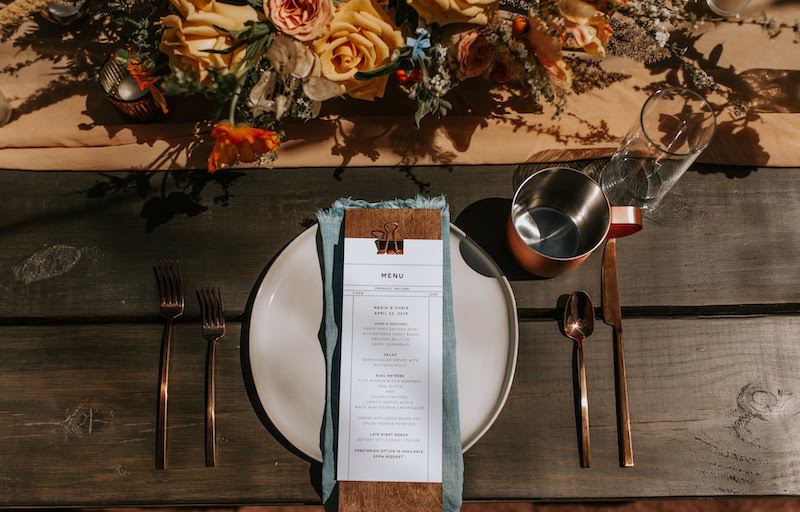
Photo courtesy of Spoke Events + Northern Native Photography
Immediate Actions To Take If You Want To Postpone
If you’ve decided to postpone, there are immediate actions you should take to ensure that your new wedding date goes off without a hitch. These actions include reviewing your contracts, coordinating with your vendors, informing your guests and arranging to alter your wedding dress.
Review Your Contracts
While it’s always important to read the fine print of your contracts, now’s the time to thoroughly read through all of the documents you signed for your wedding. So, where do you begin?
“First thing is to see how your venue and vendors are handling postponements due to the pandemic. Some may include pandemics in their force majeure clause. This is a section of the contract that protects the business if something beyond their control comes up that would make it impossible for them to carry out the terms of the contract,” says Crace. “Even if the business includes pandemics in their force majeure, they are likely still willing to work with you and find a solution, but you will have less bargaining power with them."
If pandemics are included in the force majeure clause of your contracts, you may have to proceed as stipulated. However, if pandemics aren’t covered in your agreements, you can negotiate to ensure that you’re not out any money.
“The biggest things to watch for in wedding contracts are security deposits, extra fees and cancellation fees,” says Kubin. “Make sure you understand the security deposit – you should know whether it is refundable, when it gets refunded and what happens if you need to cancel, reschedule or scale down. When it comes to extra fees, check if there are any special fees for COVID-19 guidelines, such as providing you extra space to accommodate social distancing or extra cleaning fees.”
Negotiating contracts can be challenging, but weddings are notoriously expensive – the average wedding cost $33,931 in 2018 – so it’s worth trying to persuade your vendors regardless of what’s stipulated in your contracts. Since COVID-19 is a global problem, vendors may be more compassionate. It never hurts to ask that your fees are waived or deposits returned should you need to cancel. However, it’s essential that you enter negotiations with a clear head and understanding heart. Just as you are trying to protect yourself, your vendors are trying to protect their businesses.
Coordinate With Your Wedding Vendors
Once you have a better understanding of what your entitled to do within the confines of your contracts, it’s time to coordinate with your wedding vendors.
“If you’re postponing your wedding, you should contact all of your vendors, secure the new date and negotiate financial matters,” says Kubin. “For example, if you need to cancel a vendor because they are not available for your new date, ask for a full refund of your security deposit in light of the extraordinary circumstances. If a vendor charges a rescheduling fee, ask for this to be waived.”
To prepare you for the challenging conversations ahead, Crace recommends beginning the discussion by asking your vendors the following questions about how they handle postponements:
- Have any of your policies changed in light of COVID-19?
- Are you allowing postponements during this time, and if so, what date range is acceptable for you?
- Are there any fees associated with postponing?
- If we decide to postpone, and you are unavailable on our new date, is the deposit refundable and will we be responsible for the remaining balance?
- If the deposit is nonrefundable, are services transferable to another event when you are available?
Crace explains, “Knowing the answers to these questions can help you weigh the financial impact of postponing vs. downsizing.”
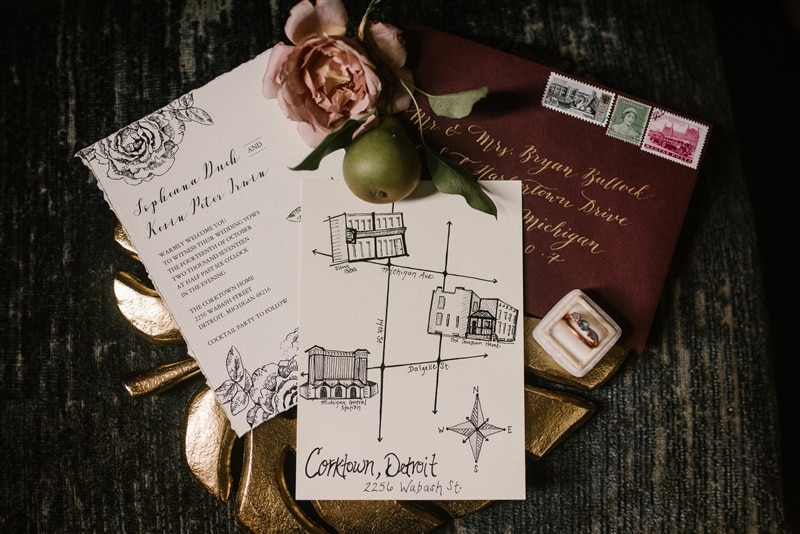
Photo courtesy of Spoke Events + Northern Native Photography
Inform Your Guests
After you’ve negotiated with your vendors and decided to postpone, you’ll have to inform your guests of your decision.
“Letting guests know your wedding is postponed can feel like the most heartbreaking part of postponing, but there are a few options for postponing that can make this process easier,” says Crace. “Consider sending a . You can send these digitally or physically in the mail. If you’re on a budget or are cutting it close to the original wedding, sending digitally may be your best option.”
Worley explains that another benefit of sending out online invitations or notifications is that you can use the opportunity to get a better sense of who will be able to attend and how many guests you’re likely to have. If you’re on the fence about postponing, getting a headcount early can help you gauge how your guests are feeling about COVID-19 and whether downsizing would be a worthwhile alternative.
What If You Have To Cut The Guest List?
Although deciding to cut your guest list can be an emotionally trying experience, it’s one of the best ways to save money on your wedding. So if COVID-19 has left you financially impaired or concerned about the safety of you and your guests, slashing your guest list and downsizing your wedding can bring you some much-needed peace of mind.
Clearly, changes to the guest list are far less awkward if you have yet to formally invite your guests, but for those of you who’ve already sent out your invitations, there are ways to go about it that can help you avoid aggravating your friends and family members.
“If you’ve already mailed your invitations but need to cut the guest list, honesty is the best policy. Simply tell those guests that you have decided to scale back to a much smaller wedding in light of health concerns,” says Kubin. “Believe me, everyone will understand. Change is the new norm during this era of COVID-19.”
While uninviting guests can be tricky to navigate, the news will be far better received with a warm, personal message. “Consider making phone calls to the guests you need to uninvite,” says Crace. “It can feel daunting to make 50-plus calls, so call in some back-up. If parents or family members asked to have someone added to the guest list initially, see if they’d be willing to help you make calls to those guests.”
If you’re struggling with the decision and not ready to have a full conversation about the postponement, Bellinger proposes crafting individual messages to each guest you plan to uninvite. If you have trouble writing it, she recommends trying out the following template:
“Hi [Insert Guest Name],
It is with heavy hearts that we reach out to you today. Given the restrictions around COVID-19 and our concern for our family and friends’ health, we have decided to dramatically downsize our wedding. We are saddened to let you know that we are no longer able to celebrate our day with you. Please accept our heartfelt apologies.
Signed,
[Your Names]”
If you’re feeling guilty about having to make cuts, shake it off. Your wedding is about you and the person you love. You’ve been dealt an unfortunate hand and are doing your best to adapt to this precarious situation. If you would like to make uninvited guests feel less slighted, you can always stream the ceremony, so they can still be a part of it.
Altering Your Wedding Dress
If you already bought a dress but unsure how to have it altered now that many bridal salons are closed, the best approach is to call them directly. You are by no means the only bride facing this issue, so most likely, the bridal shop already has a system in place to enable them to alter purchased dressed.
“As many states are opening back up, dress shops are allowing for a small number of appointments,” says Bellinger. “Many will require masks because of the close contact required for helping you get into and out of dresses.”

Photo courtesy of Spoke Events + Erin Hannum Photography
Elope Now, Celebrate Later
Since there’s so much ambiguity surrounding COVID-19 and the logistics of larger gatherings during this time, many couples are choosing to put their best foot forward by eloping now and celebrating with all of their family and friends later.
“There are no rules in eloping and throwing a ceremony again later,” says Worley. “Lots of our clients get married in a church with close family and then have another ceremony with the entire reception later because they want the church ceremony to be more intimate – and this has been a trend even before COVID.”
Exchanging vows can take many forms these days from the intimate outdoor wedding to the courthouse elopement to the virtual ceremony. These options can be as traditional or low-key as you and your future spouse desire. Although your elopement may be a stopgap solution to combat the uncertainty of COVID-19, keep in mind that it doesn’t have to feel like it.
“Micro-weddings were already a trend before COVID. Many brides have a city hall wedding – now available virtually in some cities – but there are many more romantic options for a private wedding. You can choose a location that is meaningful to you,” explains Susan Ruddie Spring, bridal stylist, designer and president of Susan Spring – The Wedding Dresser. “Hike deep into the woods. Stand under the stars on the roof of your building.”
The choices are endless, and the cost is far more reasonable. Once you have gotten the official ceremony out of the way, you can always choose to renew your vows and hold a larger party for your first anniversary. Just remember that whatever you choose should be about you and your future spouse. So don’t worry about what family and friends have to say about your decision. This is your day, so you should celebrate it however you like!
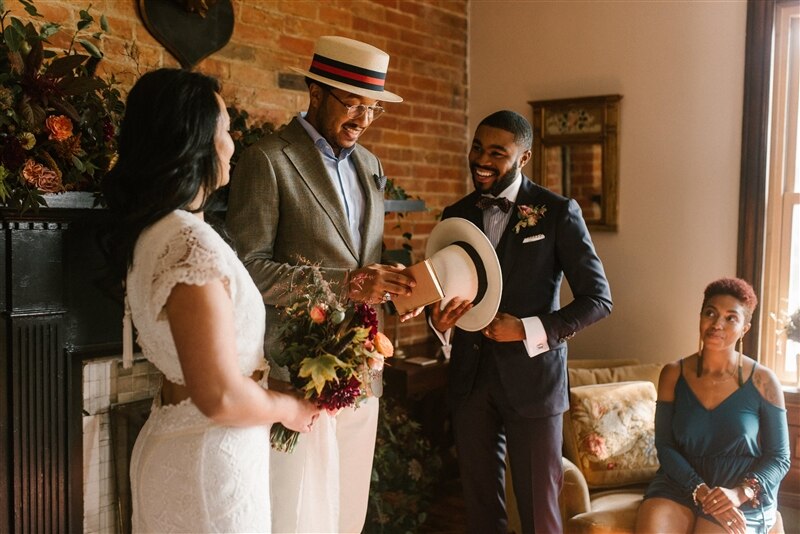
Photo courtesy of Spoke Events + Northern Native Photography
How To Plan An Elopement
Planning an elopement is far easier than a full wedding, and the more laid-back it is, the fewer logistics you’ll need to worry about. “If you have a house or outdoor space available to you that can accommodate a small group, doing a private ceremony and maybe a nice dinner there will save you some money,” says Crace. “If you need to find another location, try looking for smaller venues in your local area or consider renting out space at a park.
“Eloping locally, especially at home, can be fairly simple. Have your florist create some lush, grounded floral pieces, bring in enough chairs from your rental company and hire the officiant,” Crace adds.
It can be tricky not to get caught up in the aesthetic aspects of the affair; however, make sure you don’t forget the practical. You’ll still need to get a marriage license, and while that may have been a difficult task back in March or April, you shouldn’t run into many problems now.
“To be sure, look up how your local area is handling the distribution of marriage licenses during this time,” says Crace. “You should be able to find information on your state’s website or by calling your county clerk’s office.”
If COVID-19 has reminded us of anything when it comes to weddings, it’s the need to have a solid back-up plan in place. “If you choose an outdoor option, just make sure you have a shelter nearby or rent a tent as a rain option,” says Crace. For those who choose to go the tent route, “work with your rental company to determine the accessories that would be best with that model and recommended set-up timeline. You may decide to have the tent set-up several days in advance or to rent a floor, so you and your guests aren’t walking on wet ground.”
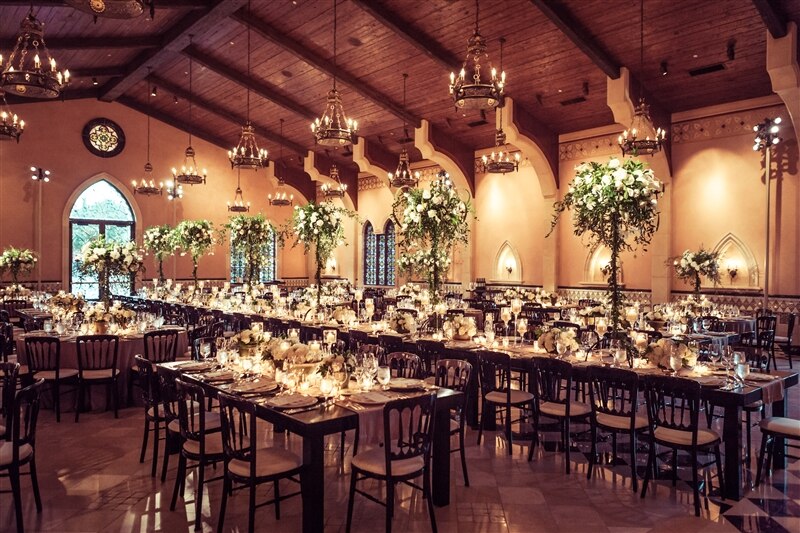
Photo courtesy of B. Worley Productions + Sean Twomey with (2)me Studios
Planning For A Wedding During COVID-19
If you just got engaged, you may be wondering whether you should wait to set a date for your wedding. After all, new cases of the virus are still popping up, and there is currently no vaccine on the horizon. Typically, couples wait a few weeks to a few months before beginning to plan; however, COVID-19 greatly complicates this timeline.
How Long Should You Wait Before Setting A Date?
If you’re interested in planning a more private wedding celebration or are willing to wait until 2022, you can take your time. Ultimately, it could be extremely beneficial to wait and see how the virus plays out. However, if you want the full shebang next year, you’re likely to run into some difficulties.
“For those getting engaged during the pandemic, first congratulations on the engagement during these wild times,” says Worley. “The thing that newly engaged couples need to know is that, as 2020 moves forward, fewer and fewer weddings for the year are taking place. So if you want to get married sooner than later, you need to be aggressive in the planning and securing a venue because 2021 could be a year of double the weddings.”
To avoid a long engagement, it’s critical that you set your date and start planning your wedding immediately. Therefore, you should begin searching for your venue now and find out what dates are still available. If you want to get married on a Saturday in 2021, you may find your options are limited. So it’s useful to determine your priorities in advance. Is it more important that you get married next year or have a weekend wedding?
But before you sign a contract for your venue, make sure that vendors are also available on that date. Again, be prepared for the need to be flexible. Just as your venue may be fully booked on your ideal date, so may your first-choice vendors. Therefore, it’s useful to rank your vendors according to preference.
How To Proceed While Many Places Remain Closed
It is certainly nerve-racking trying to plan a wedding when many venues and vendors are still closed due to COVID-19. However, just because their doors may be shut, doesn’t mean that their businesses aren’t still operating.
“You can accomplish a lot virtually. You can discuss options, get prices and even tour venues,” says Bellinger. “Venue tours can either be the 360 views, videos on the website or even via video calls with the coordinator. Vendors can be interviewed, and you can review examples remotely. I recommend getting your options narrowed down while everything is closed. Then, when it is allowed, do those in-person meetings (venue tours, food tastings, etc.).”
While there’s a lot to be done, so much of it can be completed without needing to meet anyone in person. “If you have a wedding planner, they will be helping you navigate all of these variables, but if you haven’t booked a planner yet, consider reaching out to one in your area,” says Crace. “Planners are working with countless vendors and can take the stress and pressure off of you during this season."
Hiring a wedding planner is even more beneficial now than ever before, as they are up to date on all of the current public health recommendations suggested by the CDC and WHO. Wedding planners will know what’s possible and help you negotiate your contracts to ensure that you are protected should we experience another wave of the virus.
Keep Calm And Carry On
Postponing or planning a wedding during COVID-19 is no easy task, and it’s alright to feel upset about it. Just remember that you’ll still have a beautiful wedding, be it now or 2 years from now. Talk to your venue and vendors, hire a wedding planner – if you don’t have one already – get all of the logistics out of the way and celebrate the fact that you still get to be with the person you love.
As a wise woman once said, “The most important thing is that you found each other, you are with each other, you make each other happy, and you look out for each other.”
Because at the end of the day, nothing else really matters.
Table of Contents
Related Resources
Viewing 1 - 3 of 3

